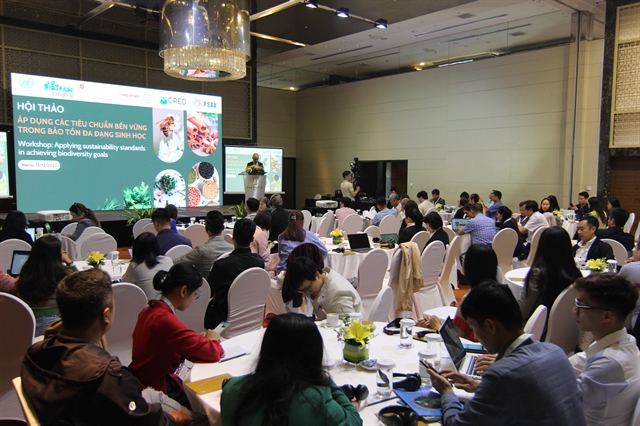HÀ NỘI – Experts discussed pathways towards promoting the application of sustainability standards in achieving biodiversity goals in Việt Nam’s agriculture sector during a workshop held on Friday in Hà Nội.

|
| Representatives attend the workshop. — Photo courtesy of the organisers. |
The workshop ‘Applying Sustainability Standards in Achieving Biodiversity Goals’ was co-organised by the Centre for Rural Economy Development (CRED), the United Nations Conference on Trade and Development (UNCTAD), Helvetas Organization, and the Department of International Cooperation – Ministry of Agriculture and Rural Development.
The workshop seeks an appropriate legal framework to facilitate the widespread application of Voluntary Sustainability Standards (VSS) in Việt Nam.
VSS are norms and standards used to ensure that products are harvested, produced, processed, or transported following specific sustainability metrics, including environmental impact, basic human rights, labour standards, and gender equality.
“VSS aims to ensure that international trade and production processes meet a certain level of economic, social and environmental criteria,” Sibylle Bachmann, Deputy Head of the Swiss Cooperation Office, said.
“By applying these standards, companies can improve their competitiveness and access to international markets, while contributing to reducing poverty and supporting livelihoods.”
Biodiversity loss constitutes a major global threat, as the World Economic Forum (WEF) reported. Unsustainable trade and consumption of products and services derived from biodiversity contribute to this decline of diversity.
The 2030 Agenda for Sustainable Development identifies international trade as a means of achieving inclusive economic growth and reducing poverty.
Currently, there are over 500 VSS that apply to key exports of many countries, such as coffee, tea, bananas, cocoa, palm oil, timber, cotton, and organic agri-foods.
VSS are increasingly included in trade agreements to promote sustainable development and good governance. VSS can effectively encourage governments and companies to adopt practices that align with environmental, social, and economic objectives.
The presentations and reports at the workshop covered promising practice examples for sustainable agriculture around Việt Nam and provided shared knowledge on international standards as effective tools for biodiversity and livelihood support.
“Coconut is an environmentally friendly crop that can be grown under polyculture methods to ensure biodiversity,” Nguyễn Thị Kim Thanh, chairman of Việt Nam Coconut Association, said.
The discussion also addressed challenges and opportunities for the application of VSS standards and led to a set of recommendations to promote the integration of sustainability standards in supply chains.
Experts in the workshop highlighted the importance of ensuring livelihood for farmers to promote the integration of sustainability standards in supply chains.
“We need to ensure the output of agricultural products to guarantee farmers’ livelihoods. Only then will farmers accept to integrate sustainability standards in their supply chains,” said Nguyễn Thị Liên, Project Manager at the Centre for Rural Economy Development. – VNS
- Reduce Hair Loss with PURA D’OR Gold Label Shampoo
- Castor Oil Has Made a “Huge” Difference With Hair and Brow Growth
- Excessive hair loss in men: Signs of illness that cannot be subjective
- Dịch Vụ SEO Website ở Los Angeles, CA: đưa trang web doanh nghiệp bạn lên top Google
- Nails Salon Sierra Madre
 VnExpress News The News Gateway of Vietnam
VnExpress News The News Gateway of Vietnam





